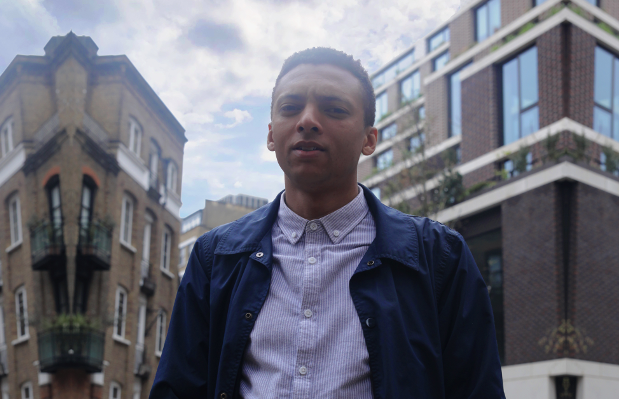
'Fake Views' Director David Allain Discusses his Passion for Operation Black Vote

‘Fake Views’ uses real quotes from politicians to urgently encourage Britain's disenfranchised youth, particularly Black and Minority Ethnic youth to register to vote.
Created by Saatchi & Saatchi London, and directed by David Allain of Hungry Man, the hard-hitting awareness campaign highlights some of the controversial words uttered by politicians. The campaign depicts the notion that politicians represent those who vote for them, and therefore, encourages BAME and minority communities to vote so they are fairly represented in Parliament.
The forthcoming election is broadly seen as one of the most important political events in generations. The campaign’s central message is that if BAME communities, and young people in general do not register to vote, others with often controversial views, will speak for them.
Q> Where did you grow up and what kind of childhood did you have?
I grew up in East London. My parents were cleaners and strictly religious. Humble beginnings. I wasn’t encouraged to pursue higher education or a career in anything creative, risky or unorthodox: my parents’ priorities were more preoccupied with preparing for the end of days! But I’d been trying to write novels since before I was 10 – escapism was always high on my agenda, and as time went by, I figured I could be a storyteller. I pursued what came naturally.
Q> Why was the OBV film important to do?
It's scary how many people don’t vote. Earlier this year, I decided I wanted to encourage young people to somehow engage with voting, and to see that it gives them a voice. It seems that when you put stuff out there, the universe sometimes comes back with opportunities. The script spoke to many of my values, so I immediately jumped aboard the project.
Q> What it means to you personally?
Privileged people often forget how close they are to being negatively impacted by other people’s prejudices. And underrepresented groups often feel they have no influence. For me, this isn’t just about race. This film importantly highlights that some elected politicians are racist, homophobic, Islamophobic, misogynist, and deny climate change exists. Many people who fail to vote do not share these values, so why let such politicians speak for them? These issues affect most of us or people we love. It’s more important than ever that we engage each other in using democracy to create a more equal world while we have the chance. We need to stop just looking out for ourselves (like so many short-sighted politicians); we need to also look out for each other.
Q> Were you always interested in directing, what sparked that interest?
Through the people I’d started working with, I saw music videos as a possible alternative to film school – I never imagined being able to afford film school anyway. Skip forward a few years, I made a music video for my friends’ unsigned band, got offered representation by a small production company the day after the video’s release, and was (sort of) on my way!
Q> Many of your films focus on social causes, is that important to you?
My social cause directing debut was making two films for a charity called SHIFT.MS; they connect people with multiple sclerosis with resources, advice, and each other. They wanted the main film to be a comedy. I believe all my work should make people feel something: whether audiences laugh, cry, feel excited or contemplative – there has to be some emotional resonance. I also feel it imperative to have a connection with the social projects I do, whether at an ideological or personal level.
Using comedy to explore difficulties faced by people managing disability in the workplace initially felt counterintuitive. Nevertheless, through this project I saw how a social idea can be made entertaining. And entertainment is often more accessible and memorable for audiences than pulling at heartstrings or dumping information on them.
Q> Have you faced difficult decisions when directing films about such difficult subject matter?
Content is often created so quickly nowadays, and without enough respect or humanity. In my experience, the most useful way to counter this is by inclusively collaborating with the community you seek to help. For instance, when preparing to make a film intended to decrease knife crime, meeting teens that had served time was the best way to learn about youth crime and gangs in London; and it gave us the best chance of depicting the subject matter realistically with nuance.
Content can never fully represent all dimensions of any person’s experience, so I seek the essence: the truth.
Q> How impactful do you think films about social causes are, have you seen how they can make a direct impact?
Films ‘about social causes’ go beyond branded content made for charities. Many people are creating socially aware content across documentaries, social media activism, podcasts, biopics, fictional films and TV. I see the direct impact of this every day: awareness rising, action taken, movements backed, and changing tides. Social causes don’t even need to be the impetus, often it’s just great storytelling or compelling commentary with a switched-on world view.
All media can be wielded for good or evil; but that won’t come as (fake) news to anyone reading this.
Q> Do you approach all your work whether an ad campaign, or documentary, in the same way, or how do you adapt your approach?
Every project requires a bespoke approach. Some campaigns intend to be lighter and more irreverent than others. That’s fair. Yet my principles remain the same: research to discover the essence, collaborate with the community, look for opportunities to empower whoever we seek to help, and try to enlist more allies by marrying compelling content with compassion for a reality lived by others. If these films don’t serve the community, you’re missing the point. If a film resonates with a community whilst reaching audiences beyond it, the amplifying effect can snowball and bring limitless change.
Q> Do you think there is a way of marrying your passion for social causes and being in the advertising game?
We’ll see what opportunities come my way, but there are definitely directors doing pretty well at raising awareness of important issues whilst smashing it in the ad game! Bryan Buckley, Richard Bullock and Kim Gehrig have all done inspiring projects in recent times.
Q> What’s on the horizon for you in the next few months?
I’m always writing, and I’ll shoot a new short film soon. After that, who knows?













